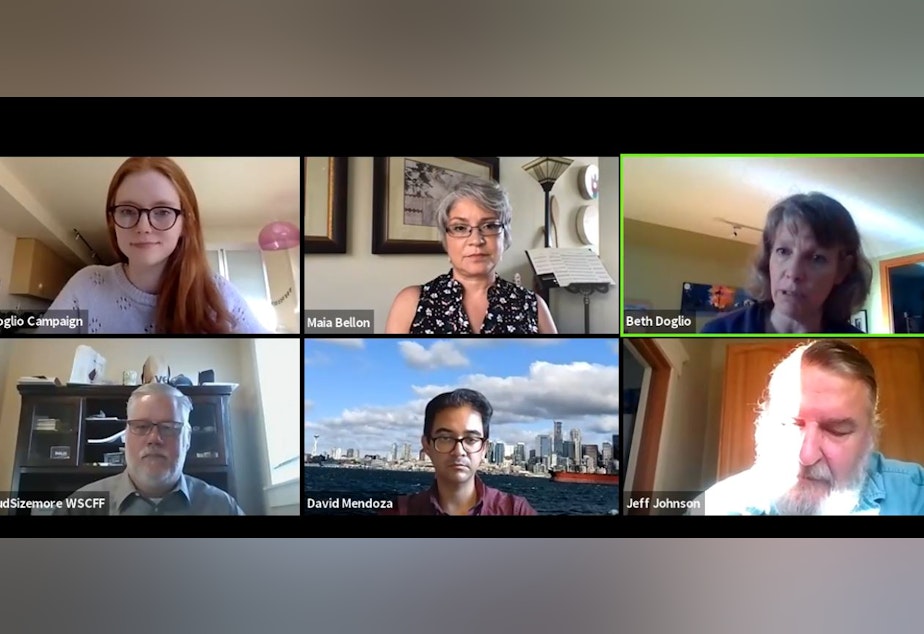Campaigning during coronavirus: Candidates get creative

Joshua Freed, a Republican running for Washington state governor, did a "FREEdom tour" across the state.
He video blogged his journey, while intermittently attending forums and fundraising events remotely, sometimes from his car.
Jack Walsh, an ice cream shop owner from Federal Way who is running for state House, took to the internet to showcase the scientific method used to create ice cream.
Washington state political candidates have had to adapt to the stay-at-home orders, which disrupted in-person fundraising events and traditional door-to-door canvassing.
Candidates have used other means to connect with voters: virtual fundraisers, online coffee chats, and political forums taking place on Zoom.
Beth Doglio, a state representative for the Olympia-Tacoma area, began her campaign right as the coronavirus pandemic was beginning in Washington state. Soon her calendar full of campaign house parties was no more.
Doglio transitioned to a new way to reach voters in the 10th District, where she's up against 18 others vying for the seat in Congress.
The plan was to meet people in their homes, where they were social distancing, through their computer or phone screen.
Sponsored
Doglio, current state representative and longtime climate activist, had to build a following within the online sphere.
"And so people just have this image of you over, you know, on Zoom meetings, " she said. "Like that's what they know about me, you know?"
Doglio's broadcasting room of preference is her bedroom, a place where she can escape interruptions.
It's an improvement, Doglio said, when compared to a Texas congressional candidate she met during an online training on being effective over Zoom.
The Texas candidate she met broadcast from the bathroom.
Sponsored
"I'm really looking forward to meeting people in person," Doglio said.
The pandemic has made meet and greet Zoom affairs more palatable, said Cathy Allen, Washington state political consultant.
She was present on May 27 when Alyse Galvin, an Alaskan Independent candidate running against incumbent Republican Don Young, held one of these events.
More than 50 people attended, and Galvin managed to raise $15,000 in a single night, without meeting donors in person.
Despite their success, Allen said she has doubts the longevity of these online events.
Sponsored
“I don't think that meet and greets online are going to actually make it,” she said. “I think they'll drop by the wayside, because people still want to look folks in the eye and tell them the truth.”
But even with Washington counties loosening the distancing measures, and door-belling beginning again, some candidates have decided not to visit households where people over the age of 55 live.
“They are the ones that are apparently more nervous about people coming to the door,” Allen said. “And (candidates) are nervous themselves over those doors, but younger voters are definitely fair game as what they see.”
Payton Swinford, a campaign staffer in the Kitsap County area, said the creativity he’s seeing is in the messaging coming from campaign offices to voters.
“The question on everyone's mind right now is, ‘Is there an appetite on the other end of the phone for politics?’” Swinford said. “If you're not sure if your audience wants to talk about politics, how are you going to engage them into talking about your candidate?”
Sponsored
This is done by first acknowledging the pandemic. The candidate comes second.
For instance, a campaign volunteer might use the following script when calling up voters.
“Hi -- we would be canvassing but due to restrictions in place, we’re calling to make sure community members have access to these resources. Would you like us to connect you to these resources?”
Traditionally, Swinford said, early in a campaign, outreach will ask voters what’s on their mind politically.
“For any campaign to be asking that question seems kind of foolish right now because we already know the answer. Its economy, healthcare or Covid-19.”
Sponsored
To the caller’s benefit, Covid-19 is engaging voters in a “weird kind of way,” said Spencer Lively, president of the Young Democrats of Washington. Campaign workers engaging with voters by phone are doing so more successfully.
“When we’re phone banking we cycle through a lot of people who don’t pick up, but for the people who do pick up and do want to have conversation, it’s been a different atmosphere thanks to the quarantine,” Lively said. “We’re potentially talking to someone who hasn’t been able to talk to anyone in a while.”

